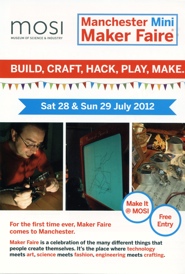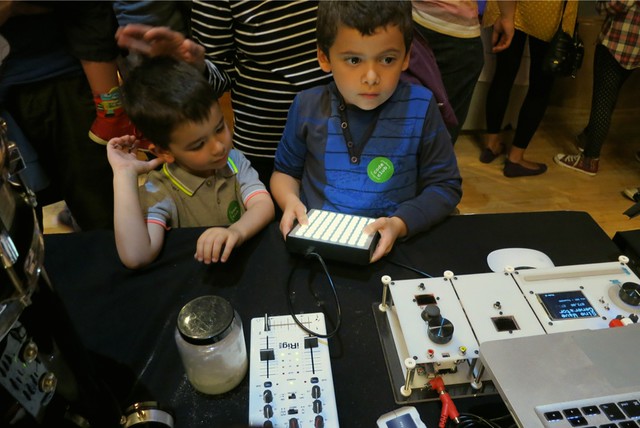Manchester Mini Maker Faire ’12
MOSI hosted Manchester’s first ever Mini Maker Faire along with the help of a small group of makers over the weekend of 28-28th July 2012. I showcased the latest iteration of my Augmented Tonoscope instrument.
From a Manchester Girl Geeks post…
Manchester Mini Maker Faire will be a family-friendly and *totally free to attend* gathering of enthusiastic makers, showing the wealth of ingenuity that there is in Greater Manchester and beyond. This is a great opportunity to meet other Makers, exchange ideas, and see some great (and sometimes crazy) inventions.
Makers range from tech enthusiasts to crafters, educators, tinkerers, hobbyists, engineers, artists, science clubs, students, authors, and commercial exhibitors. They are of all ages and backgrounds. Maker Faire’s mission is to entertain, inform, connect and inspire these thousands of Makers and aspiring Makers.
From ‘Makers in almost their own words’…
The Augmented Tonoscope is an artistic study into the aesthetics of sound and vibration through its analog in visual form – the modal wave patterns of Cymatics. (edited down)
Maker Faire Manchester visitors will be able to explore the capabilities of this audiovisual instrument which will be configured in such a way as to make it immediate, accessible, playful, engaging and hopefully awe-inspiring too.
The Manchester Mini Maker Faire was a great opportunity (and deadline) for me to rationalise and refine various components of my Augmented Tonoscope device and present them to the general public.
But it was also a chance to share. A significant part of my practice is concerned with ‘making’ – be it DIY electronics and micro controllers, CAM (computer aided manufacturing) or creative coding. Much of what I’ve realised has been via online research – through the many forums, community sites and countless individual blogs that have grown around these burgeoning areas of interest and activity. This has created an extremely knowledge-rich global community of makers and creative coders who enthusiastically share their knowledge, facilitating a distinctly progressive field of research. So keeping in the spirit of this free exchange of knowledge and information, I’m keen to make my own modest contribution to these communities, sharing what I’ve learnt and making my own evolving evolving tool set, methodology, code and software, electronic and design schematics, documentation and outputs freely available under a Creative Commons Attribution-Non-commercial- ShareAlike licence. There’s more on my thinking here in an earlier post on Creative Commons.
I also wanted to see how my research might be received outside academia. One particularly insightful comment came from a woman who stood and read the description on my stand’s poster – essentially from the ‘Makers in almost their own words’ above – and then reflected that while she understood what the words meant individually, she had no idea what they actually meant collectively. This was a first realisation that I needed to find ways to describe my research in a more accessible language.
There’s also something very levelling about trying to explain your PhD research to a seven year old.


